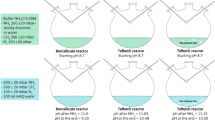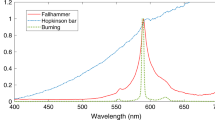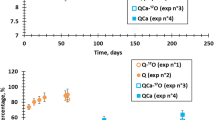Abstract
IN a discussion of the standardisation of hydrochloric acid with different standard substances (J. Amer. Chem. Soc., 70, 1772, 1926), I made the following remark: “After the substance [borax] had been dried at 200°, the crucible was placed in an electric oven at a temperature of 700–750°, until constant weight was attained. When afterwards it was heated at 800°, at which temperature the salt fuses, the weight did not change. We cannot confirm the statement of H. V. A. Briscoe, P. L. Robinson, and G. E. Stephenson (J. Chem. Soc., 122, 150, 1925), who state that fused borax loses sodium oxide. Even after the substance had been heated for two hours at 800° the weight did not change.”
This is a preview of subscription content, access via your institution
Access options
Subscribe to this journal
Receive 51 print issues and online access
$199.00 per year
only $3.90 per issue
Buy this article
- Purchase on Springer Link
- Instant access to full article PDF
Prices may be subject to local taxes which are calculated during checkout
Similar content being viewed by others
Author information
Authors and Affiliations
Rights and permissions
About this article
Cite this article
KOLTHOFF, I. On the Volatility of Borax. Nature 119, 425–426 (1927). https://doi.org/10.1038/119425b0
Issue Date:
DOI: https://doi.org/10.1038/119425b0
This article is cited by
Comments
By submitting a comment you agree to abide by our Terms and Community Guidelines. If you find something abusive or that does not comply with our terms or guidelines please flag it as inappropriate.



